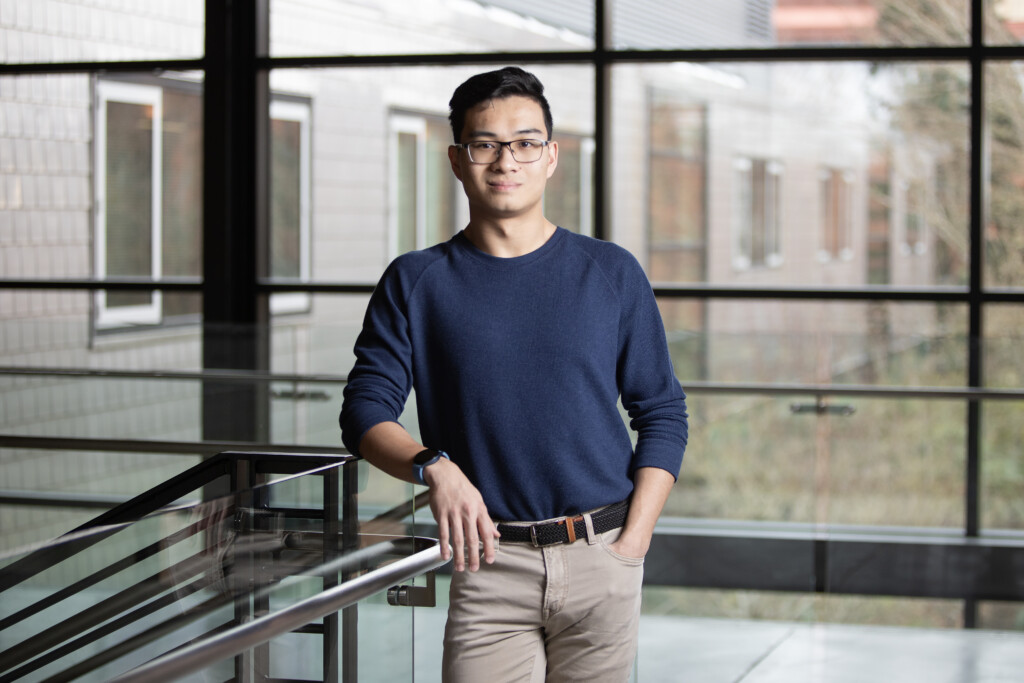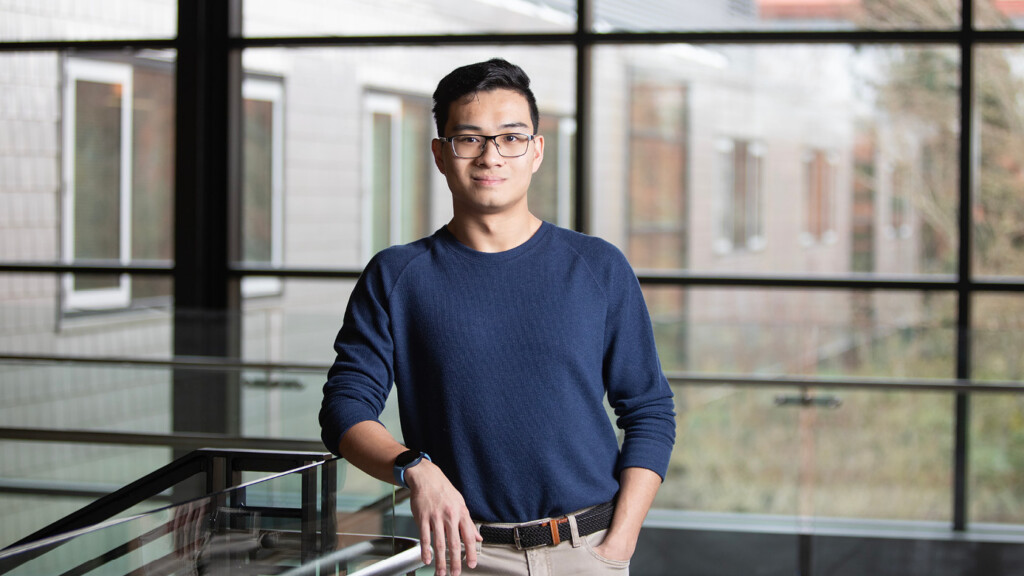Page 20 • (1,906 results in 0.019 seconds)
-

Meet Brian Sung, a business major from the class of ’24 at PLU. When he’s not taking international honors courses or diving deep into his double majors in business and economics , he’s all about data science and statistics through his double minors. Outside of…
Brian Sung ’24 talks business, econ majors, Oxford adventure, and his unique PLU journey as a first-gen Chinese immigrant Posted by: mhines / March 21, 2024 March 21, 2024 By By Fulton Bryant-Anderson ’23 PLU Marketing & Communications Guest Writer Meet Brian Sung, a business major from the class of ’24 at PLU. When he’s not taking international honors courses or diving deep into his double majors in business and economics, he’s all about data science and statistics through his double minors
-

Brian Sung ’24 has made the most out of his PLU years inside and outside the classroom. In the classroom, he’s an international honors student with a double major in business and economics and a double minor in data science and statistics. Outside the classroom,…
Brian Sung ’24 discusses his business and econ majors, Oxford trip, and PLU experience as a first generation Chinese immigrant Posted by: tpotts / April 4, 2024 April 4, 2024 Brian Sung ’24 has made the most out of his PLU years inside and outside the classroom. In the classroom, he’s an international honors student with a double major in business and economics and a double minor in data science and statistics. Outside the classroom, he’s served as DECA Club president, a resident assistant, and
-

Brian Sung ’24 has made the most out of his PLU years inside and outside the classroom. In the classroom, he’s an international honors student with a double major in business and economics and a double minor in data science and statistics. Outside the classroom,…
Brian Sung ’24 discusses his business and econ majors, Oxford trip, and PLU experience as a first generation Chinese immigrant Posted by: nicolacs / March 15, 2024 Image: Brian Sung ’23 is a double major in business and economics. He recently interned at Russell Investments. (Photo by Sy Bean/PLU) March 15, 2024 By Fulton Bryant-Anderson ’23PLU Marketing & Communications Guest Writer Brian Sung ’24 has made the most out of his PLU years inside and outside the classroom. In the classroom, he’s
-
This page features resources for students and families. Check back frequently. Considering traveling or studying in China? See what these students from Wayne State University have to say about their
For StudentsThis page features resources for students and families. Check back frequently. Considering traveling or studying in China? See what these students from Wayne State University have to say about their experiences and advice for other students visiting China. Check out the Student Exchange Blog! Books List of Chinese Textbooks Recommended Dictionaries The ABC English-Chinese, Chinese-English Dictionary Chinese Language Programs STARTALK: Summer Student Program at Gonzaga University
-
Confucius Institutes are a non-profit initiative of the Hanban, the executive body of the Chinese Language Council International, a non-governmental and non-profit organization affiliated to the
AboutConfucius Institutes are a non-profit initiative of the Hanban, the executive body of the Chinese Language Council International, a non-governmental and non-profit organization affiliated to the Ministry of Education of China. As of 2016, over 500 Confucius Institutes have been established in 130 countries around the world, with over 100 in the United States. “Confucius Institutes devote themselves to satisfying the demands of people from different countries and regions in the world who
-
Graduation Year: 2016 Majors: Economics, Chinese Studies Study Away: Antarctica and Argentina, J-Term 2014; IES Beijing, China Fall, 2014 My study away experiences informed me that the beginning
Sonja SchaeferGraduation Year: 2016 Majors: Economics, Chinese Studies Study Away: Antarctica and Argentina, J-Term 2014; IES Beijing, China Fall, 2014 My study away experiences informed me that the beginning transition of getting to know your new location in the world, the new role you play, the new task at hand, and the new people that surround you is exhausting, but so rewarding in the unexpected knowledge that you gain. I now work in Washington, DC in a congressional office. I keep the
-

If you search for the CV of Assistant Professor of Computer Science Renzhi Cao, Ph.D., you’ll find a list of published research papers longer than Foss Field. He says it’s a great feeling when a new piece of research is published. But what he finds…
and timely scholarship. “One of my goals at PLU is to promote early engagement of undergraduate students – especially for women and underrepresented students – in machine learning, bioinformatics, and the data science field,” he says. “I want to inspire students to pursue advanced STEM education and research careers.” Cao explains: “Not only is research interesting for the students, I think it’s truly an important part of their education in computer science. I liken it to the Chinese proverb, from
-

TACOMA, WASH. (Sept. 11, 2018) — Pacific Lutheran University welcomes the I Am Psyched! National Tour to campus, where it will be housed in the Mortvedt Library until Sept. 24. I Am Psyched! is a multimedia initiative launched by the American Psychological Association Women’s Programs…
it will be housed in the Mortvedt Library until Sept. 24.I Am Psyched! is a multimedia initiative launched by the American Psychological Association Women’s Programs Office to explore the history and contemporary contributions of women of color in psychology as they engage in psychological science, practice and social justice. The I am Psyched! National Tour got started in early 2017 with an installation at Howard University in Washington, D.C. The exhibit traveled across America to 12
-
CIWA Board Chair Geoff Foy, Associate Provost of Graduate Programs and Continuing Education
to promoting stronger commercial, educational, and cultural engagement with China. Jim Mockford President, Northwest China Council Established 1980. Our mission is to promote a greater understanding of Chinese history, culture, business, and contemporary affairs in the Pacific Northwest. 10:45AM - 12:00 Noon Panel 2: Cultural Connections Paul Manfredi Professor of Chinese, Pacific Lutheran University Zhu Yuming Poet, painter Lü De’an Poet, painter Zhang Er Poet, Librettist, Tacoma Method 12:00PM
-
Post Graduate Certificate candidates may apply for admission at any time during the year. However, application by the early application dates will enhance your potential for admission and for
Application TimelinePost Graduate Certificate candidates may apply for admission at any time during the year. However, application by the early application dates will enhance your potential for admission and for arranging financial assistance. Early Application Dates: Priority Date #1 : December 1 Priority Date #2 : February 1 Priority Date #3: March 15 Final Deadlines: Spring Start: December 1 Summer Start: May 1 Applications submitted after the early application dates will be reviewed on a
Do you have any feedback for us? If so, feel free to use our Feedback Form.


